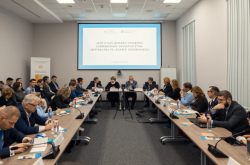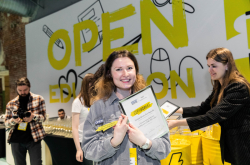The online intensive course Educational Challenges in the BANI World was taken by more than 200 members of the university’s teaching and administrative staff (including 65 who received professional training certificates). Over the course of three days, 38 speakers delivered 34 reports and three discussions were held – resulting in 23 hours total of video footage (the lectures can be viewed on the ITMO.Expert YouTube channel).
Each of the three days was dedicated to one or another aspect of the BANI concept. The first day revolved around brittleness and the destruction of existing frameworks. The second day covered the anxiety that accompanies these rapid changes. Finally, the third day paired non-linearity and incomprehensibility, the two final qualities of such processes.
“The world is becoming increasingly unstable; its chaotic nature grows at an exponential rate. In these circumstances we, the Department of Academic Affairs, feel the importance of providing regular support to the teaching staff,” says Anastasia Pozdnyakova, a teaching methodology specialist at the department. “We interact with various parts of ITMO and are able to connect them with one another. This lets us regularly share important news and useful educational practices. Moreover, we’re always available to provide moral support.”
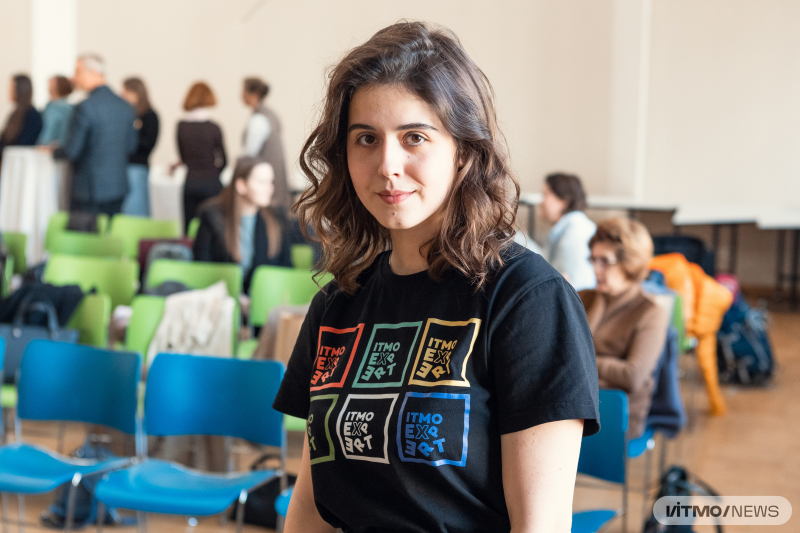
Anastasia Pozdnyakova. Credit: Dmitry Grigoryev, ITMO.NEWS.
Key topics of international relations
Russia’s withdrawal from the Bologna Process and return to a separate educational system – does it signify the end of Bachelor’s and Master’s programs and a revival for Specialist’s degrees? Global polarization and heated relations between nations – does that put academic mobility and international internships in danger? Will Russian diplomas be recognized overseas? Can graduates apply to Master’s or PhD programs abroad?
These questions were answered by representatives of ITMO’s various departments and the First Vice Rector Daria Kozlova. In her report, she shared insights from government bodies and leading universities’ work groups, which are currently working on possible strategies with the Ministry of Science and Higher Education.
According to Dr. Kozlova, the two-tiered system will remain in place at all universities; Specialist’s programs will be implemented in those subject areas where they are already in use. The nation’s withdrawal as a participant of the Bologna Process does not nullify the value of Russian diplomas; international relations remain strong; and the reduction in the number of universities available through semester exchange will be compensated by the expansion of the domestic academic mobility system. At the same time, the country’s leading universities, including ITMO, are provided a greater degree of freedom and flexibility in forming their development strategies and organizing the learning process.
Academic mobility was also covered in a report by Ekaterina Tulugurova, the head of the International Educational Programs Department. At the moment, ITMO retains approximately 60% of its international partner universities, with 60 students going on exchange in the current semester. The university is currently in contact with universities in CIS nations, Middle East, India, Africa, and Asia that are, too, interested in developing their international networks. The European scholarship system Erasmus+ continues to function, as well. The now-defunct financing programs for international trips will be replaced by new tools (such as the presidential scholarship for abroad studies).
Will online education replace universities?
Today, the thing students want the most is to receive a practical education that meets the needs of employers and, therefore, guarantees quick and steady employment. At the same time, they are often drawn to short-term and, ideally, remote programs. Such demands can often be met by major online platforms, which provide lectures by practicing experts, the ability to study at one’s preferred pace without going anywhere, and the chance to work on actual industry cases.
So, what can universities offer if they want to catch up to the rapidly developing EdTech market? What sets ITMO apart from others is that it’s able to quickly adapt to the needs and wants of prospective students. To do that, it learns from others and actively partners with major online learning services. In this academic year, two new online Master’s programs have been launched: Machine Learning Engineering from the Faculty of Infocommunication Technologies and Napoleon IT (read more here) and Product Design from the Institute of International Development and Partnership and the learning platform Netology (read more here). The heads of these programs – Dmitry Botov, an associate professor at the Faculty of Infocommunication Technologies, and Antonina Puchkovskaia, the head of ITMO’s Digital Humanities Center, spoke about the advantages of online education that ITMO can benefit from and the challenges that online learning can help resolve.
According to Dmitry Botov, students of online courses become junior specialists after completing their studies, whereas in the current economy, companies aren’t ready to hire employees without much experience and train them. Students of ITMO’s online Master’s programs will become sought-after middle specialists once they graduate. This was made possible by cooperation with leading companies on the market and hiring experts from the industry as lecturers, as well as the provided opportunity for students to work on real-life cases, take internships at partner companies, and more. For ITMO, this experimental program is a way to implement new educational practices (such as peer reviewing among students) and increase the number of enrolled students from 20-30 to over a hundred.
Alexandr Kapitonov, Dean of the Faculty of Infocommunication Technologies, noted that remote learning is popular among students in IT. According to him, in times of uncertainty, they prefer to stay in their home region with a stable job, but they’re ready to attend short-term on-site events, such as hackathons, bootcamps, intensive courses, and so on.
At the same time, IT specialists tend to prefer studying in the workplace instead of getting a degree. However, Alexandr Kapitonov emphasizes that this may lead to a lack of soft skills, an issue often overlooked by programmers. They might be great at coding, but they have a hard time working in a team, explaining their choices, and delegating tasks. That’s why, among other things, the university should help develop such skills.
What kind of educational programs do students want?
This topic was thoroughly discussed at the intensive course. As part of the special track for heads of educational programs and their teams, specialists talked about the design and implementation of educational programs, their assessment and promotion, as well as cooperation with industrial and international partners.
Heads of educational programs also made reports to share their experience with colleagues. Among them were both experienced and fledgling leaders: Dmitry Botov, Daria Denisova, Alexandr Kapitonov, Andrey Karsakov, Pavel Kustarev, Alexander Mayatin, Anna Orlova, Antonina Puchkovskaia, Maksim Sergeev, and Maksim Khlopotov.
They paid special attention to corporate and project-oriented programs that are most popular among students. Andrey Kulikov, the head of the Higher School of Engineering and Technology, and Pavel Kustarev, the dean of the Faculty of Software Engineering and Computer Systems, talked about their experience in implementing such programs.
Many experts mentioned project- and practice-oriented programs, and most of them believe that such an approach really benefits the development of flexible curricula and helps enrich students’ experience by letting them form teams and work on real tasks set by business partners. Such features require the creation of highly personalized programs and correspond to the tasks of ITMO’s Development Strategy 2030 called Open-Source University.
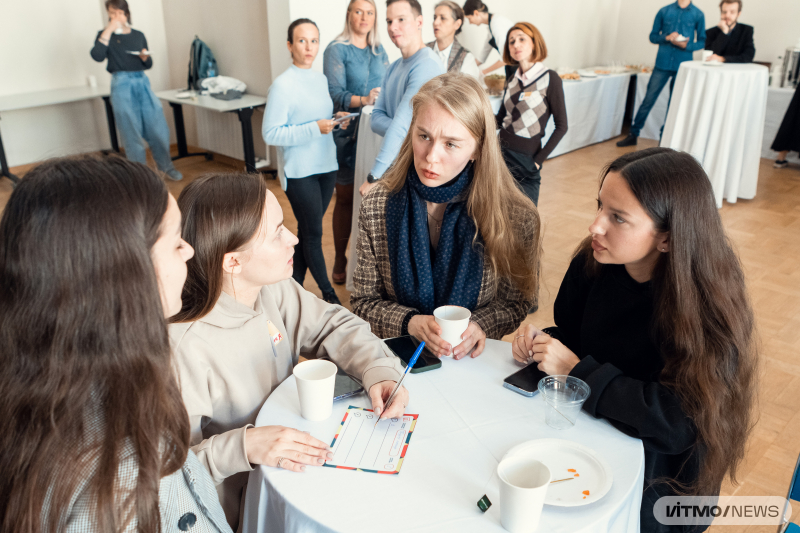
Photo from the intensive course. Credit: Dmitry Grigoryev, ITMO.NEWS.
Dealing with anxiety
Almost all discussions and presentations touched on the topic of anxiety. Lecturers shared their ways to deal with stress. For example, Olga Eliseeva, the head of the Department of Educational Quality Assurance, believes that in the BANI world, one should think like an entrepreneur and learn how to act instead of panicking when something goes wrong – and the way to do that is by managing risks and turning to experts for help when you lack the needed competencies.
Elena Sharapanovskaya, the head of ITMO’s Medical, Psychological and Social Assistance Center, led a session on dealing with anxiety. She discussed the psychological mechanisms responsible for anxiety, as well as ways to avoid it becoming a disorder and getting rid of the so-called cultivated anxiety.
Coordinator of the strategic project Well-Being Evgenii Raskin talked about the opportunities for personal and physical growth, mental healthcare, and leisure that are available via the service BE ITMO. The list includes not only sports and trips to ITMO’s outdoor camp Yagodnoe, but also creative coworking spaces and relaxation areas for employees.
Maria Didkovskaia, head of the Internationalization Department, suggested signing up for soft skills courses meant for lecturers and employees. The list of subjects includes emotional intelligence, time management for lecturers, efficient communication, etc. Moreover, staff members are welcome to apply for a consultation or a coach session by soft skills lecturers.
Format matters
Overall, the questions discussed in the course can fit into four categories: trends in education, flexible studies, opportunities offered by ITMO, and today’s educational programs. The participants could pick sessions according to their interests.
During the three days, they’ve also worked on essays on the BANI world and discussed the results via a specially developed app. To many, such communication made them feel supported.
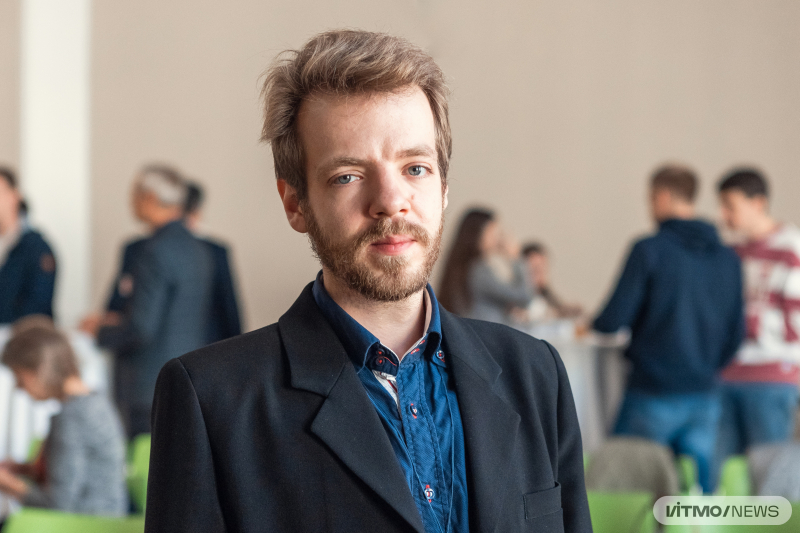
Alexey Durnev. Credit: Dmitry Grigoryev, ITMO.NEWS.
“As a philosopher, I tackle the problem of modernity but in a more abstract way. Here, however, I could learn how my colleagues see the new changes in education, what trends they observe and how they react to them. Daria Kozlova’s presentation on trends in Russian education was especially helpful to many. Plus, it was great to learn more about the services available to staff members,” says Alexey Durnev, a lecturer of philosophy.
The online course ITMO.Expert has been held for three years in a row right before the start of the academic year. It aims to form ITMO’s expert community and provide an opportunity for lecturers to discuss relevant questions and trends in education, as well as exchange experience and focus on the new semester. The summer intensive course traditionally opens ITMO.Expert’s new season. You can follow its news on Telegram and VK.




